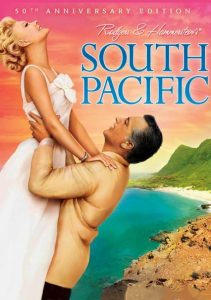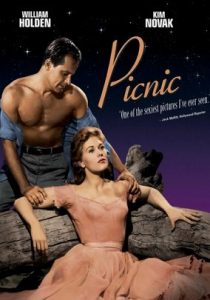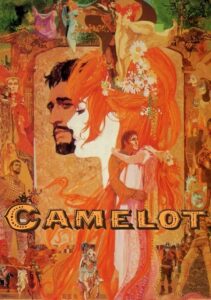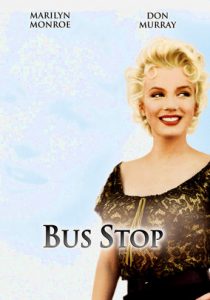South Pacific-1958
Director Joshua Logan
Starring Rossano Brazzi, Mitzi Gaynor
Scott’s Review #903

Reviewed May 29, 2019
Grade: A-
South Pacific (1958) contains a magical and romantic aura that will mesmerize the dreamy viewer seeking exotic paradise and cinematic escapism.
Marveling at distinctive and experimental color hues to shift from sequence to sequence, usually from romantic to ordinary scenes, the film has otherworldly appeal and lavish locale sequences, some actual, others studio manipulations.
The surrounding war story is relevant, the interracial relationship is more progressive than the times were, and the two leads share tremendous chemistry.
Combined with catchy songs, these qualities make the film a darling watch, providing tremendous enjoyment and an impassioned payoff.
The film may not be the best of all musicals, but there is little to criticize.
Attractive Navy nurse Nellie (Mitzy Gaynor) falls head over heels for suave French plantation officer Emile (Rosanno Brazzi) as the pair enjoy an excellent date amidst the gorgeous beach landscape. The feeling is mutual, and Nellie and Emile seem destined for happiness.
He confides to her that he once killed a man in his native France, causing him to flee his country, never to return. The Navy requests Nellie spy on Emile to utilize him against their hated Japanese enemy.
In a separate but just as romantic story, Tonkinese trader Bloody Mary (Juanita Hall) is determined to marry her beautiful, dark-skinned daughter Liat (France Nuyen) to handsome Lt. Joseph Cable (John Kerr). However, he refuses to marry her due to prejudicial feelings, throwing away a chance at lasting happiness.
Despite his best efforts, he cannot get her out of his mind, and the couple reunites briefly before tragedy strikes.
The World War II backdrop plays heavily into the story, and atmospheric elements make the film ooze with sensuality and sunny desire. The result is good, escapist fun, with brazen musical numbers added to set the perfect tone.
They contrast the island where most events occur with foreboding military airplanes flying overhead, some manned by the main characters dangerously, with a hint of foreshadowing.
South Pacific has much to be treasured for, especially with its songs.
For one thing, all of Rodgers & Hammerstein’s immortal songs from the stage productions “Some Enchanted Evening,” “Bali Hai,” “There Is Nothing Like a Dame,” “I’m in Love With a Wonderful Guy,” “Younger Than Springtime” is retained, and, as a bonus, a song cut from the original stage production, “My Girl Back Home,” is revived herein.
The songs are integral to the plot and hold up well, especially the robust “I’m Gonna Wash That Man Right Outa My Hair,” which is naughty as Nellie sings it from the shower.
After the successful release of the film version of Oklahoma! (1955) Rodgers & Hammerstein decided to tackle the South Pacific as their next big project. The stakes were high due to the success achieved by the former, but the latter did not measure up.
Some thought Gaynor was miscast, but I personally like her just fine.
Nonetheless, the production is gorgeous and entirely on par with Oklahoma! Because the films were produced by the same people and were released close together, many similarities can be ascertained between them.
Although the South Pacific may be a far cry from the midwestern USA, both films have an outdoorsy feel. Numerous scenes use luscious natural landscapes to add beauty to the big screen.
A key point to remember is that the South Pacific is far from fluff despite the tendency for comic scenes or light-sounding numbers.
The film distinguishes itself quite well with a strong anti-war slant as Emile decries killing and promotes harmony in more than one scene, almost like the film encourages us to learn from a French man rather than an American.
To this end, the critical subject of racism is brought up not only in the Liat/Cable story but also when Nellie struggles with the notion of raising two children of a different race.
Although not revisited as often as unforgettable genre contemporaries like West Side Story (1960) or The Sound of Music (1965) and justifiably not as dynamic, South Pacific (1958) is a lovely film with impressive key production values, a worthy story, and enough sing-along tunes to keep one humming for days.
The picture never feels dated and exists as a timeless member of the stage productions magically brought to the big screen club.
Oscar Nominations: 1 win-Best Scoring of a Musical Picture, Best Sound (won), Best Cinematography, Color



